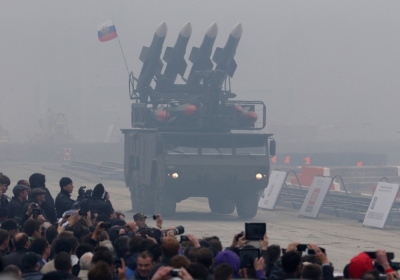Stanislav Petrov Saved Your Life and Mine, And I Thank Him

This morning I woke up as I usually do, to the sounds of my daughter babbling through the baby monitor. I heated her milk and watched her happily slurp it down. I put the coffee on while my wife prepared for work. It was a morning like any other, filled with the sheer goodness of normal life.
And then—because I clearly spend too much time on Twitter—I thought to myself, "#ThankYouPetrov."
As vividly depicted in the new film The Man Who Saved the World, Stanislav Petrov was the on-duty officer at a Soviet advance warning base on Sept. 26, 1983, when computers indicated a surprise nuclear attack by the United States. If Petrov had authenticated the attack, as protocol required, the USSR would have certainly launched a (mistaken) retaliatory strike, initiating nuclear war, the deaths of hundreds of millions and social collapse on a planetary scale.
But Petrov "had a funny feeling in his gut." He followed conscience over protocol, did nothing and helped the crisis to pass without incident. Billions of people woke up the next morning to babies cooing and coffee brewing—unaware that for a few moments the previous night, everything had hung in the balance of one man's decision.
I was a six-year-old in Top Gun-era San Diego when Petrov made his choice. And that means I owe everything in my life since then to Petrov's decision, by the grace of God, not to do what he was supposed to do. From high school swim meets and college parties, to marrying my wife and holding my daughter for the first time—for everything between the silly and the sublime, I have to say, "Thank you, Petrov."
Petrov's actions were unknown to the public until after the fall of the Soviet Union. The intervening years had not been kind. His decision saved the world but ruined his career. It had revealed the unreliability of a system that was supposed to be perfect, and Petrov as a man who put conscience over chain of command.
So he had been punished by the military. He suffered terrible loss in his personal life and endured a nervous breakdown.
Finally, however, he is getting the recognition he deserves.
This week, college campuses nationwide are participating in a screening day of The Man Who Saved the World—a major American showing for a film by Danish director Peter Anthony that has received standing ovations, audience awards and critical praise around the world. It is a human tale about a subject that often feels inhuman, interspersing gripping reenactments of that fateful day in 1983 with documentary footage of Petrov's 2006 visit to the United States.
The film is a parable for our age. Our technological achievement means that individual decisions can now have a global impact. But human nature has not changed. Like the Petrov we meet in The Man Who Saved the World, we are all broken people in desperate need of redemption and love. The absurdity at the heart of the movie is that flawed mortals now wield the power of God, of life and death over all humanity.
Worse, it's an absurdity that outlasted the Cold War—last month marked the twentieth anniversary of another near miss—and remains today. U.S. and Russian missiles are still pointed at each other, ready to launch at a moment's notice. It's an insane and totally unnecessary risk—especially when, as in 1983, rising tensions and mistrust between the two countries mean that conflict could rapidly escalate.
The U.S. nuclear missile corps has been rocked in recent years by revelations of a massive cheating scandal, accidents including missing nuclear weapons, officer misconduct and abysmal morale. President Barack Obama, who won the 2009 Nobel Peace Prize for his "vision of and work for a world without nuclear weapons," has put forward a thirty-year, $1 trillion plan to upgrade the American nuclear arsenal and last week solidified a U.S.-India nuclear trade deal, despite India's refusal to comply with international law governing nuclear weapons.
Meanwhile, an increasingly aggressive Russia is flying nuclear-capable bombers near NATO airspace and just withdrew from a cooperative U.S.-Russia venture to secure nuclear material from terrorists.
We owe everything to Petrov's choice. But the real moral of The Man Who Saved the World is that no human being should be in his position in the first place. We can't continue to play with nuclear fire and expect not to get burned.
An increasing chorus of leaders worldwide, including former Cold Warriors like George Shultz, Bill Perry, Sam Nunn and Henry Kissinger, are now saying that it's time to get rid of nuclear weapons altogether. And a recent conference on the humanitarian consequences of nuclear weapons, attended by 158 nations, saw a rising wave of international support for closing "the legal gap for the prohibition and elimination of nuclear weapons"—just as we've done with other weapons of mass destruction.
Achieving a world without nuclear weapons is an action we can, should and must do. And it would be an appropriate way to say, "#ThankYouPetrov."




























